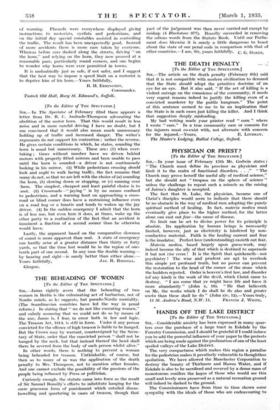[To the Editor of THE SPECTATOR.] SIR,—In The Spectator of
February 22nd there appears a letter from Dr. B. C. Andrade-Thompson advocating the abolition of the motor horn. That this would result in less noise and in more careful driving I have no doubt, but I am convinced that it would also mean much unnecessary holding up of traffic and increased danger. The writer's arguments do not support his contention ; rather the reverse. He gives certain conditions in which, he states, sounding the horn is usual but unnecessary. These are: (1) when over- taking ; times without number have we driven behind motors with properly fitted mirrors and been unable to pass until the horn is sounded—a driver- is not continuously looking in his mirror. (2) While pedestrians crossing should look and ought to walk facing traffic, the fact remains that many do not, so that we are left with the choice of (a) sounding the horn, (b) slowing down or stopping, or (c) running over them. The simplest, cheapest and least painful choice is to hoot. (3) Crossroads—" jaying " is by no means confined to pedestrians, and a warning hoot on approaching a cross- road or blind corner does have a restraining influence even on a road hog or a lunatic and tends to waken up the jay driver. (4) In the sudden emergency I admit that the horn is of less use, but even .here it does, at times, wake up the other party to a realization of the fact that an accident is imminent a fraction of a second sooner than he otherwise would have.
Lastly, the argument based on the comparative slowness of sound is more apparent than real. A state of emergency can hardly arise at a greater distance than thirty or forty, yards, so that the time lost would be in the region of one- tenth part of one second. In any case the double warning— by hearing and sight—is surely better than either alone.—


























































 Previous page
Previous page